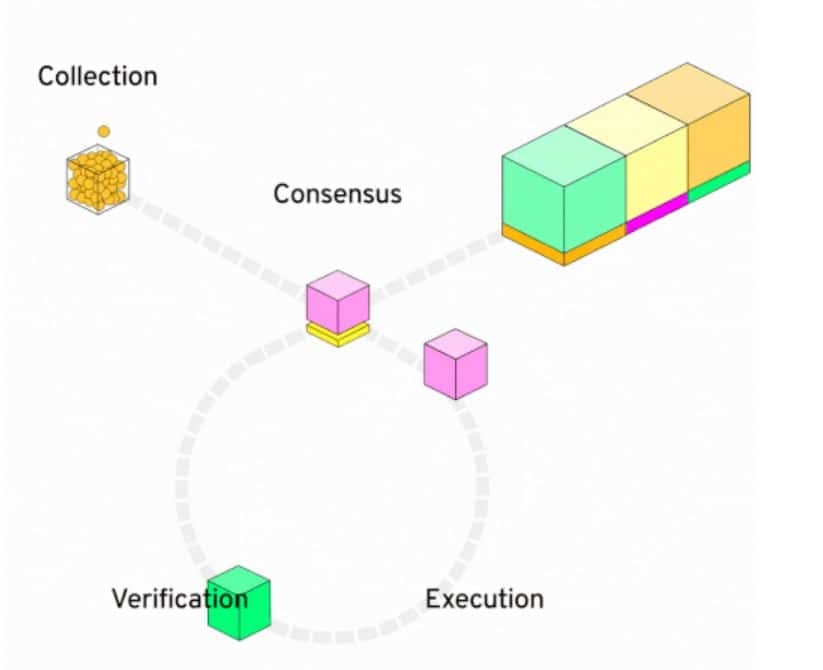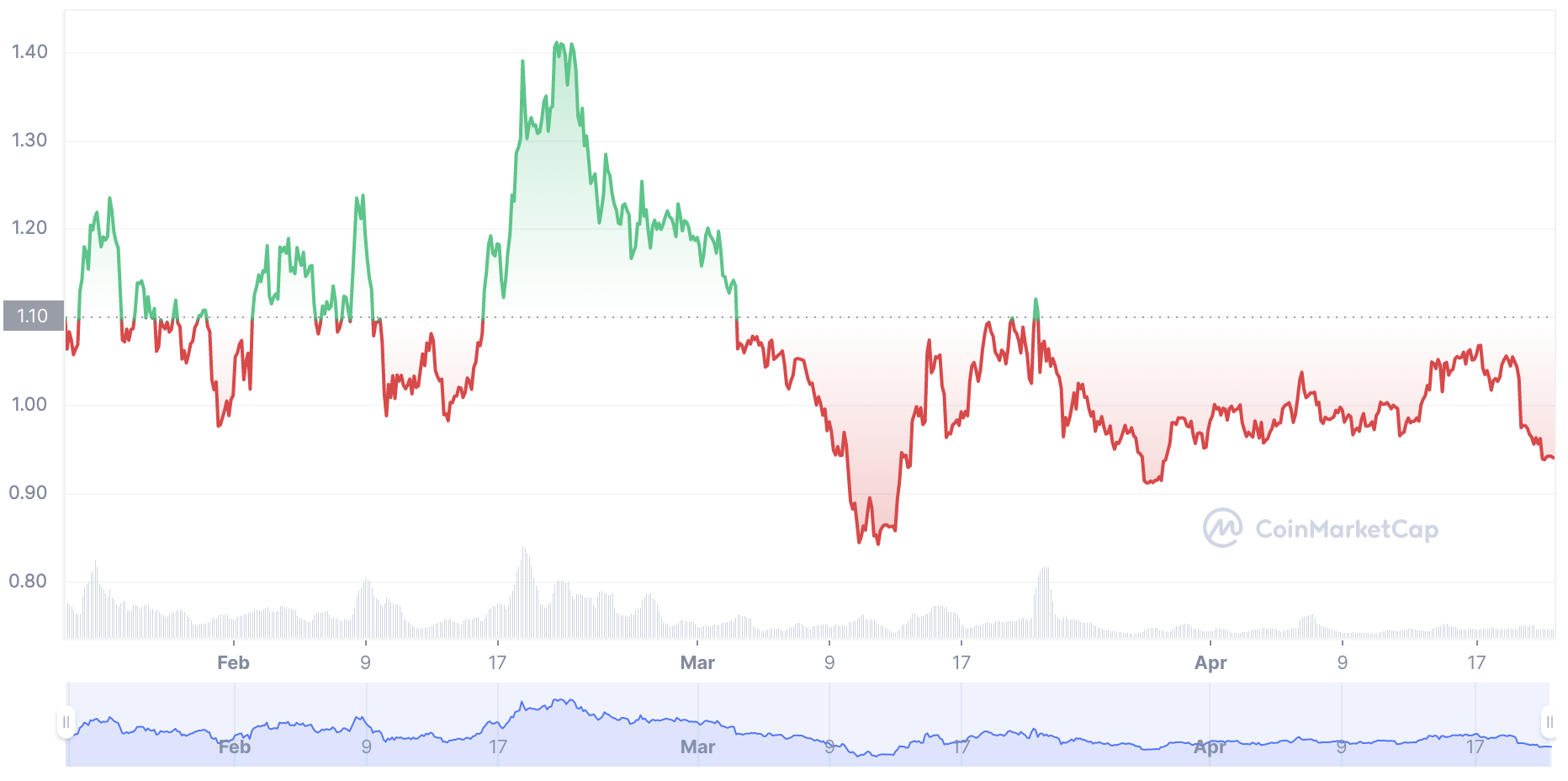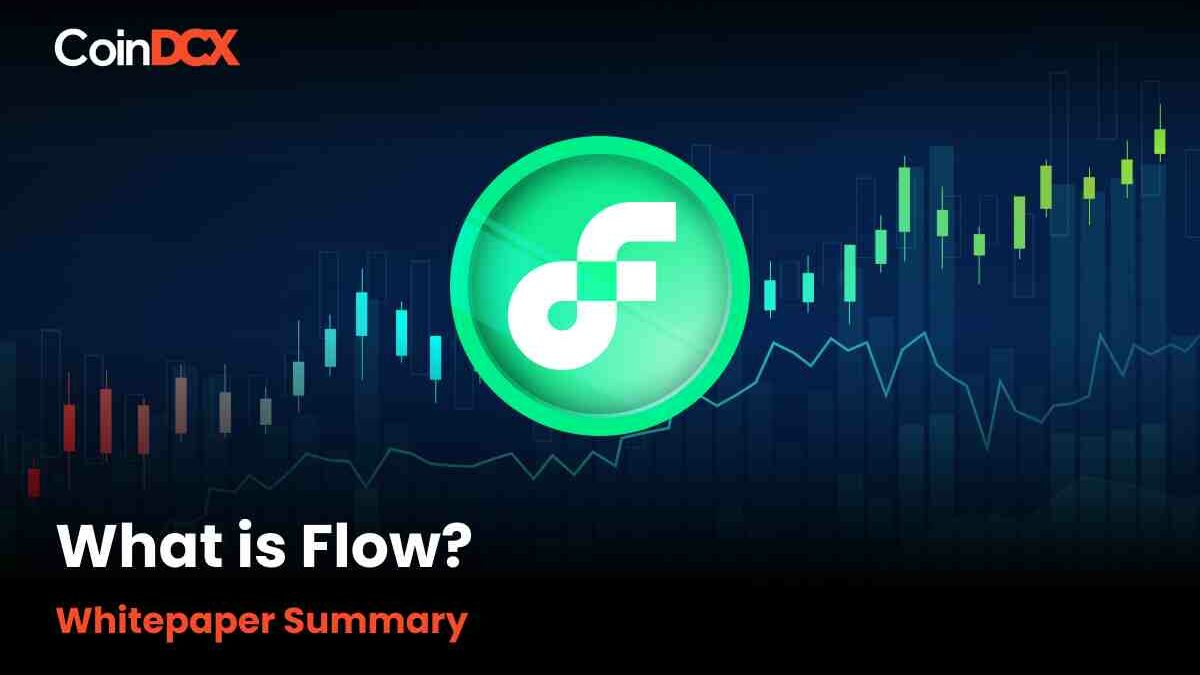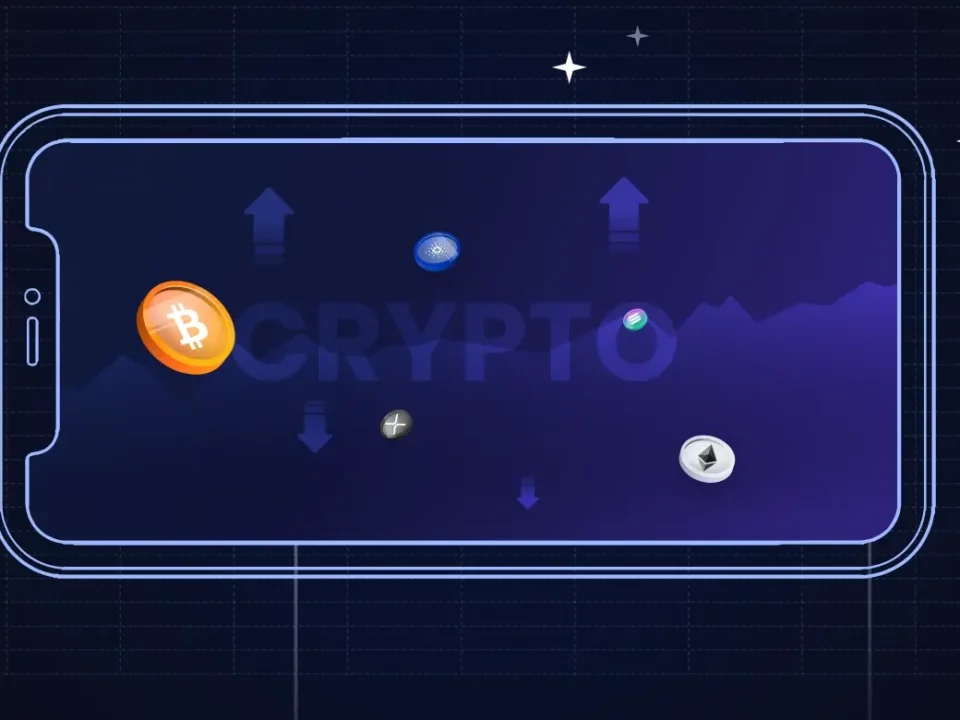Table of Contents
ToggleIntroduction
The Dapper Labs team, who created CryptoKitties (A popular game on Ethereum blockchain) in 2017, has developed flow blockchain. Flow was developed to offer scalability solutions for things like games, digital assets(like NFTs), and other apps. The purpose of Flow is to deliver a blockchain that avoids network sharding (as sharding essentially transfers the most difficult aspect of scaling the blockchain to application developers rather than addressing it at the protocol level.) and upholds trustworthy decentralization.
Flow divides jobs and data among five different types of nodes rather than having each node hold all of the blockchain’s data. The aim of dividing the work between nodes is to minimize the time and effort invested into the nodes to increase efficiency. By using a method known as “SPoCKs,” or Specialized Proofs of Confidential Knowledge, the developers of Flow have found a solution to the Verifier’s dilemma (which arises due to a lack of incentives for validating and storing records of new transactions in PoW consensus protocols).
Emergence
As previously reported, Dapper Labs, a Canadian business working with the Ethereum blockchain, created their first NFT game, CryptoKitties. Virtual kitties are owned, bred, and traded by players in the game and are represented by non-fungible ERC721 tokens. After its launch in November 2017, the game’s popularity exploded, quickly surpassing 10,000 members and overloading the Ethereum network, which resulted in high gas prices.
Dapper Labs got to work on a new blockchain specifically tailored for digital collectibles, games, and other NFTs to overcome the technological obstacles they were facing. In October 2020, Dapper Labs raised $18 million on CoinList by selling FLOW, the native token of the Flow blockchain, through a public sale.
With the prestige that came with CryptoKitties’ success, Dapper Labs was able to get contracts with well-known companies including the NBA, Warner Music Group, UFC, and Ubisoft. NBA Top Shot, a marketplace for NFTs with a basketball theme, had a surge in popularity in late 2020. Additionally, Dapper Labs secured an additional $305 million in early 2021, on the success of NBA Top Shot, bringing the company’s total worth to $2.6 billion.
Recently on 4th August 2022, META announced that it will support NFT posting utilizing the Flow blockchain, on its well-known photo-sharing platform Instagram.
Architecture
Flow Multi-Role Architecture

Source: Flow Multi-Role Architecture
There are four main categories for the flow network’s miners and validators. This division into smaller groups speeds up the whole network and helps prevent duplication of effort. The network operator requires a stake from each validator or miner. This reduces the possibility of fraudulent transactions being passed off as legitimate ones.
The key elements of Flow Multi-Role Architecture include:
- Consensus nodes: They control the existence and sequence of transactions on the network.
- Verification nodes: They are in charge of maintaining order among the execution nodes.
- Execution nodes: Complete the calculations necessary to complete the transactions.
- Collection Nodes: They ensure that the whole network is linked to its decentralized apps and that there is sufficient data available for the execution nodes to operate with.
It’s interesting to note that the Flow architecture makes it possible for a single node to penalize and initiate recovery from erroneous data introduced by malicious Collection or Execution nodes. The consensus and verification nodes take care of security, according to the fundamentals of flow blockchain, by using crypto-economic incentives to promote network-wide responsibility.
A PoS algorithm is used by the consensus nodes. The network might be optimized for the necessary degrees of decentralization and security using consensus and verification nodes. Increased levels of engagement in the Flow blockchain network are also made possible by Consensus and Verification nodes.
The majority of deterministic work is performed by execution and collection nodes, reducing their vulnerabilities. Other node types hold execution and collection nodes accountable while validating their job. Therefore, it is safe to make sure that the execution and collection nodes are properly optimized for greater scalability and security.
Flow is unique among blockchains. It has various features which differentiate it from other blockchains some of which are:
◆Multi-role architecture: The network can scale to service billions of users thanks to Flow’s fundamental architecture, which is distinct and prevents sharding or diminishing decentralization of consensus.
◆Resource-oriented programming: Flow uses Cadence, a faster and safer programming environment specially designed for digital assets and smart contracts.
◆Developer Ergonomics: Flow is a tool created by developers, for developers, that allows creating new apps and protocols secure, quick, and effective.
◆User-friendly onboarding: The only blockchain that incorporates usability enhancements into the protocol layer is Flow, which was created from the bottom up for mass adoption.
◆Built-in user base: Leading developers and some of the biggest businesses in the world (including the NBA, UFC, Dr. Seuss, and others) are already utilizing Flow to cater to fanbases numbering in the billions.
Competitors
Flow blockchain was introduced in 2020, and many are already calling it a viable substitute for Ethereum for the development of NFTs. It is a quick, decentralized blockchain that runs entire ecosystems of applications, particularly those about games and digital valuables. With a $225,169,217 USD 24-hour trading volume, the current live FLOW price is $2.91 USD and a market cap of $3,020,352,034 USD. The following is a list of competitors and alternatives for FLOW:
Ethereum: The majority of NFT initiatives run on the Ethereum blockchain as ERC-721 tokens, which is the market leader in decentralized finance (DeFi) due to its extremely secure network and data design. Due to the several drawbacks of creating NFTS on Ethereum, including high transaction fees and scalability problems, Dapper Labs developed the FlOW blockchain.
WAX: WAX (Worldwide Asset eXchange) is an eco-friendly blockchain and protocol token that has been specifically created to speed up, simplify, and secure e-commerce transactions. It is a verified carbon-neutral blockchain. WAX uses a Delegated Proof-of-Stake (DPoS) consensus mechanism in which users of the network vote and elect delegates to validate the next block. Topps (Major League Baseball), Capcom (Street Fighter), Atari, Funko, Lionsgate, and many other brands have introduced NFTs on WAX.
Matic: Using a sidechain approach, Matic attempts to address some of the most significant issues with Ethereum, such as its throughput, poor user experience (high speed and delayed transactions), and lack of community control. Developers and players will be able to create and play games more successfully with the help of Polygon’s Commit Chain scaling technology and the Ethereum network. Aavegotchi, Neon District, Zed Run, and Cometh, among other popular gaming and NFT Dapps, have grown their user experiences using Polygon.
Read more: Polygon Whitepaper Summary
Tokenomics
The native token of the Flow blockchain is called FLOW, and it was created to act as a medium of trade as well as a long-term reserve asset for the Flow blockchain economy.
 Source: CoinMarketCap
Source: CoinMarketCap
The cost of FLOW is $0.94 as of April 21, 2023. The live market capitalization is over $975,041,518 and has a circulating supply capped at 1,036,200,000 FLOW with a circulating supply of 1.04 Billion FLOW.
The FLOW token in particular is the primary token needed for staking on the platform and the currency in which staking rewards are distributed. Additionally, users must maintain a minimum balance to provide enough storage on the network and a small amount of FLOW tokens is needed to cover transaction fees.
FLOW is intended to provide advantages as a collateral asset for new tokens issued on top of the Flow network since it is a low-inflation cryptocurrency. Stablecoin and defi protocols fall under this category. To support the development of these protocols that will benefit the Flow ecosystem, the developers have put aside 100 million FLOW tokens. Given Dapper’s predictions, adopting FLOW as a collateral asset implies that if the demand for secondary tokens, such as stablecoins, rises, so too should the demand for FLOW tokens.
Additional Read: Flow Price Prediction
Roadmap and Vision
Flow is the driving force behind the NFT frenzy, which is still going strong. Other developers are waiting to access the blockchain created by Dapper Labs as a result of NBA Top Shot’s popularity.
But interest isn’t just being shown by developers. The NFT marketplace Rarible has announced that it would expand to Flow and has secured $14.2 million to do so. Previously, it has only concentrated on NFTs based on the Ethereum platform.
In addition, flow is growing. FUSD, the first stablecoin backed by the dollar on Flow, was introduced in June 2021 by Dapper Labs. Along with exploring stablecoins, Flow envisions a future as a platform for more complex crypto games.
Holders of FLOW will be able to use the coin in a variety of ways as the Flow blockchain continues to grow. Transaction costs for validation services, a medium of exchange, security for backup tokens, involvement in governance, and deposits for data storage are some of these.
Flow has a long way to go, just with the announcement of the partnership with the leading social media company “META” it has gained very much popularity, and this will certainly help to increase its user base rapidly.
Conclusion
Flow blockchain is an open, decentralized blockchain that aims to provide a single platform for supporting developing blockchain use cases. As the world has seen a tremendous increase in the deployment of NFTs, blockchain network traffic will undoubtedly bring some challenges. However, options such as the Flow blockchain should be considered.
The Flow blockchain is designed for large-scale scalability. It enables quick and low-cost transactions, making it perfect for DApps like NFT marketplaces and crypto games.
The principles of Flow blockchain discussed in this talk focus on its definition and key characteristics. The Flow blockchain is unique among other existing blockchain networks due to its multi-node architecture.
Disclaimer: User Generated Content – Original Content created by a member of BITS Pilani, under the consultation of Dr. Amit Dua, Assistant Professor, Computer Science Department, BITS Pilani, Pilani Campus in association with CoinDCX. The views and opinions expressed within this post belong solely to the author.
Author: Vipul Walunj, Aarya Attrey, Yash Bansal, Parth Bisen, Madhav Madhusoodanan, Chandra Sekhar Reddy E
Related posts
Understanding the Different Types of Cryptos: Coins, Tokens, Altcoins & More Explained
Explore the major types of crypto assets and their unique roles.
Read more
PAWS Telegram Game: The New Tap to Earn Game That Is Beating Hamster Kombat
Discover how to play and earn with PAWS Telegram game.
Read more


